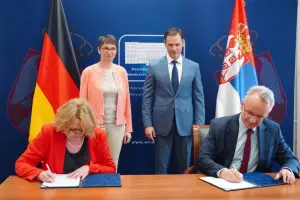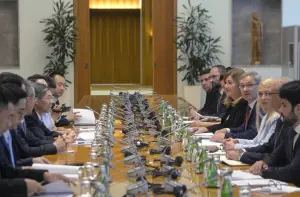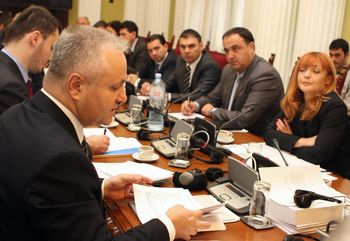- Serbia
Get to know Serbia
- Citizens
Culture and science
Health services
Pension and disability insurance
- Business
Employment
Economy
- Media
- Government
- Contact
Keep in touch
Contact form
Back
Keepin touch
Whether you have a question, comment, suggestion or any problem in the purview of the government, send us your message and we will try to respond as soon as possible. If your problem is not in our purview, we will forward your message to the relevant institution.
Q:
A:
Parliament’s Committee on Finances adopts proposed budget for 2013
Belgrade,
21 November 2012
Minister of Finance and Economy Mladjan Dinkic said today that the achievable projected budget deficit for 2013 is 3.6% of the gross domestic product (GDP).
Speaking at a session of the Committee on Finances of the Serbian parliament, he reiterated that it is necessary to cut by half the budget deficit next year and stop the growth of public debt, and explained that budget expenditures grow because of interests on loans.
We will reduce the public debt by the sale of public property which is used uneconomically and will reduce the need for borrowing, the Minister said.
He announced that the registry of the number of public employees will be completed by the second half of 2013 at the latest in order to plan more precisely the funds needed for salaries and strictly control new hiring.
According to him, a plan of repaying half of the debt in the amount of RDS 26 billion to the health sector has been made, as well as a plan of repayment of a significant part of the debt to builders and road construction workers, and a new element is the introduction of a three-year plan of capital investments.
Dinkic said that transfers to local self-governments will amount to RSD 35.3 billion, while the cities and municipalities will receive an additional RSD 4 billion for the maintenance of regional roads.
Representatives of the Ministry of Finance and Economy did not accept the proposal of the Fiscal Council and the International Monetary Fund (IMF) to abolish transfers from the budget to local self-governments, the Minister stated, and called on the Fiscal Council to hold a meeting with the Standing Conference of Towns and Municipalities (SCTM).
Dinkic underlined that he is satisfied with the cooperation with the Fiscal Council, but noted that he does not agree with its assessment that the state will not be able to repay its debts with the dynamics planned.
According to him, the proposal of the Fiscal Council to define quarterly amounts for budget expenditures as one of the measures that should allow for the control of the implementation of the budget is acceptable.
The Minister reiterated that it is realistic that budget expenditures be smaller in 2013 and that the growth in budget revenues is expected as a result of the introduction of a 25% tax rate for transactions in "tax havens" and introduction of "conditional tax amnesty."
Also, he added, the structure of subsidies has been changed, so that subsidies for agriculture have been increased by approximately RSD 8.5 billion, with the budget for agriculture accounting for 4.5% of the total state budget.
Dinkic specified that the subsidies to economies have been reduced by RSD 4.8 billion, as well as budget lending, while social welfare allowances have been increased by approximately RSD 8 billion.
The Committee on Finances adopted the proposed budget for 2013 after the discussion.
We will reduce the public debt by the sale of public property which is used uneconomically and will reduce the need for borrowing, the Minister said.
He announced that the registry of the number of public employees will be completed by the second half of 2013 at the latest in order to plan more precisely the funds needed for salaries and strictly control new hiring.
According to him, a plan of repaying half of the debt in the amount of RDS 26 billion to the health sector has been made, as well as a plan of repayment of a significant part of the debt to builders and road construction workers, and a new element is the introduction of a three-year plan of capital investments.
Dinkic said that transfers to local self-governments will amount to RSD 35.3 billion, while the cities and municipalities will receive an additional RSD 4 billion for the maintenance of regional roads.
Representatives of the Ministry of Finance and Economy did not accept the proposal of the Fiscal Council and the International Monetary Fund (IMF) to abolish transfers from the budget to local self-governments, the Minister stated, and called on the Fiscal Council to hold a meeting with the Standing Conference of Towns and Municipalities (SCTM).
Dinkic underlined that he is satisfied with the cooperation with the Fiscal Council, but noted that he does not agree with its assessment that the state will not be able to repay its debts with the dynamics planned.
According to him, the proposal of the Fiscal Council to define quarterly amounts for budget expenditures as one of the measures that should allow for the control of the implementation of the budget is acceptable.
The Minister reiterated that it is realistic that budget expenditures be smaller in 2013 and that the growth in budget revenues is expected as a result of the introduction of a 25% tax rate for transactions in "tax havens" and introduction of "conditional tax amnesty."
Also, he added, the structure of subsidies has been changed, so that subsidies for agriculture have been increased by approximately RSD 8.5 billion, with the budget for agriculture accounting for 4.5% of the total state budget.
Dinkic specified that the subsidies to economies have been reduced by RSD 4.8 billion, as well as budget lending, while social welfare allowances have been increased by approximately RSD 8 billion.
The Committee on Finances adopted the proposed budget for 2013 after the discussion.
-
 Požega, 5 July 2025
Požega, 5 July 2025Section of Pakovraće - Požega highway officially opened
-
 Belgrade, 2 July 2025
Belgrade, 2 July 2025Technical specifications defined for Serbia-Hungary oil pipeline
-
 Belgrade, 30 June 2025
Belgrade, 30 June 2025IMF confirms Serbia successfully implementing all agreed reforms
-
 Belgrade, 27 June 2025
Belgrade, 27 June 2025Double Taxation Avoidance Agreement with Germany signed
-
 Kostolac, 25 June 2025
Kostolac, 25 June 2025Construction of Kostolac wind farm nearing completion
-
 Belgrade, 24 June 2025
Belgrade, 24 June 2025Government supports request for new postponement of sanctions against NIS
-
 Belgrade, 23 June 2025
Belgrade, 23 June 2025Procedures to facilitate sale of Serbian products to China to be accelerated
-
 Belgrade, 21 June 2025
Belgrade, 21 June 2025Serbia receives first funds under Growth Plan for the Western Balkans
-
 Belgrade/Cairo, 20 June 2025
Belgrade/Cairo, 20 June 2025New phase in relations with Egypt in field of agriculture
-
 Belgrade/Athens, 18 June 2025
Belgrade/Athens, 18 June 2025Serbia’s leadership position in power sector

